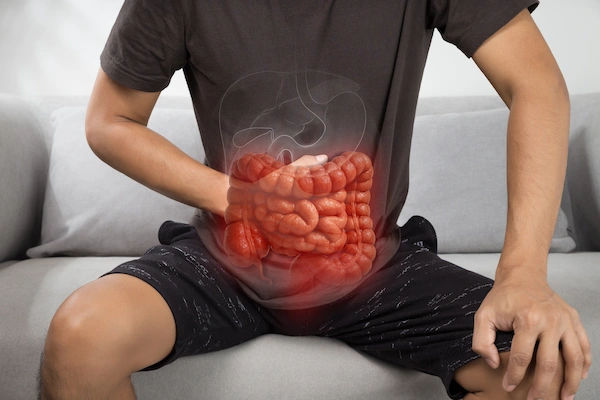What Leads To Signs Of Functional Gastrointestinal Disorders And
Discover the signs and causes of Functional Gastrointestinal Disorders (FGIDs). Learn about common symptoms, what triggers them, and effective management strategies for a better quality of life.

Written by Dr. M L Ezhilarasan
Reviewed by Dr. Rohinipriyanka Pondugula MBBS
Last updated on 13th Jan, 2026

Introduction
Have you ever experienced persistent bloating, stomach cramps, or unpredictable bowel habits that leave you frustrated, but all your medical tests come back "normal"? You're not alone. This is the confusing reality for millions living with functional gastrointestinal disorders (FGIDs). Unlike conditions with a visible cause like an ulcer or inflammation, FGIDs are characterized by symptoms without an obvious structural or biochemical explanation. This article dives deep into the complex world of FGIDs, unraveling the science behind what truly leads to these perplexing signs. We'll explore the critical gut-brain connection, identify common triggers, and outline pathways to effective management, empowering you to take control of your digestive health.
What Exactly Are Functional Gastrointestinal Disorders (FGIDs)?
Functional gastrointestinal disorders (FGIDs) are a group of conditions classified by chronic or recurring symptoms related to any part of the digestive system. The key term is "functional." This means that while the symptoms are very real and often debilitating, they occur because the digestive system isn't working (functioning) as it should, rather than because there is a detectable disease, inflammation, or structural abnormality like a tumor or infection. Think of it like a software glitch in a computer rather than a broken hardware component.
The Gut-Brain Connection: The Central Player
At the heart of most FGIDs is the gut-brain axis—a complex, bidirectional communication network linking your central nervous system (your brain and spinal cord) with your enteric nervous system (the intricate web of neurons lining your gut). This axis regulates digestion, from enzyme secretion to muscle contractions. When this communication line is disrupted, it can lead to the hallmark symptoms of FGIDs.
Functional vs. Structural: What's the Difference?
It's crucial to distinguish between functional and structural disorders. Inflammatory Bowel Disease (IBD), like Crohn's disease, involves visible inflammation and damage to the intestinal tract—a structural problem. Celiac disease involves an immune reaction to gluten. FGIDs, like Irritable Bowel Syndrome (IBS), show no such visible signs under a microscope or in a scan, making them a diagnosis of symptoms after ruling out other conditions.
Consult Top Specialists
The Primary Triggers and Underlying Causes of FGIDs
The development of FGIDs is rarely due to a single cause. Instead, it's often a perfect storm of several factors interacting.
A Miscommunication on the Highway: The Gut-Brain Axis
The gut-brain axis is the superhighway where most FGID problems begin. Signals between the gut and brain can become altered, leading to two primary issues:
Altered Gut Motility: Too Fast or Too Slow
This refers to the contractions of the intestinal muscles. In some people with FGIDs, these contractions can become too strong and rapid, leading to diarrhea, cramping, and urgency. In others, motility can slow down, resulting in constipation, bloating, and discomfort.
Visceral Hypersensitivity: Feeling Too Much
This is a lowered pain threshold in the internal organs. Individuals with visceral hypersensitivity perceive normal digestive processes—like gas moving through the intestines or the stomach stretching after a meal—as painful, bloated, or overly uncomfortable. It's not that there's more gas; it's that the brain interprets the signals from the gut as more painful.
The Role of Your Gut's Ecosystem: Microbiome Dysbiosis
Your gut is home to trillions of bacteria, collectively known as the gut microbiome. A healthy, balanced microbiome is essential for good digestion. An imbalance in this ecosystem, known as dysbiosis, is strongly linked to FGIDs. Certain bacterial strains may produce excess gas or interact with the gut lining and nervous system in ways that exacerbate symptoms like bloating and pain.
The Impact of Diet and Food Sensitivities
While food doesn't cause FGIDs, it is a major trigger for symptoms. Common culprits include:
- High FODMAP Foods: Fermentable Oligo-, Di-, Mono-saccharides And Polyols are short-chain carbohydrates that are poorly absorbed in the small intestine. They draw water into the gut and are fermented by bacteria, causing gas, bloating, and pain in sensitive individuals.
- Spicy foods, fatty foods, caffeine, and alcohol can directly irritate the gut lining or stimulate motility.
Psychological Factors: Stress, Anxiety, and Depression
The gut-brain connection works both ways. Just as gut trouble can make you feel anxious, psychological stress can wreak havoc on your digestion. Stress hormones can alter gut motility, increase visceral sensitivity, and even change the composition of the gut microbiome, creating a vicious cycle where stress worsens gut symptoms, which in turn increases stress.
Genetic Predisposition and Family History
Research suggests that FGIDs like IBS can run in families, indicating a possible genetic component. You may inherit a predisposition for a more sensitive gut or a reactive nervous system, which then interacts with environmental triggers to produce symptoms.
Past Infections and Environmental Triggers
A significant number of IBS cases begin after a severe bout of infectious gastroenteritis ("food poisoning"). This is called post-infectious IBS. The initial infection seems to trigger long-lasting changes in gut nerve function and immune activity, leading to persistent symptoms long after the infection has cleared.
Common Types of Functional GI Disorders and Their Telltale Signs
FGIDs are categorized based on the specific symptoms and the part of the gut they affect.
Irritable Bowel Syndrome (IBS)
The most well-known FGID, IBS, is characterized by abdominal pain linked to changes in bowel habits. It's sub-typed as:
- IBS-D: Diarrhea-predominant
- IBS-C: Constipation-predominant
- IBS-M: Mixed (alternating diarrhea and constipation)
Common symptoms of functional dyspepsia and IBS often overlap, but IBS is focused lower in the digestive tract.
Functional Dyspepsia (Indigestion)
This disorder is centered in the upper abdomen. Its signs include:
- Early satiety (feeling full quickly after starting to eat)
- Postprandial fullness (an uncomfortable fullness after a meal)
- Upper abdominal pain or burning unrelated to eating
Functional Bloating and Constipation
These can occur as part of IBS or as standalone disorders. Functional bloating is a feeling of abdominal distension without a clear physical cause. Functional constipation involves difficult, infrequent, or seemingly incomplete bowel movements without a known organic cause.
How Are Functional Digestive Disorders Diagnosed?
Diagnosing an FGID can be a process of elimination. Since there is no definitive lab test, doctors rely on the Rome Criteria—a set of symptom-based guidelines developed by experts—to make a positive diagnosis.
The Rome Criteria: A Standard for Diagnosis
For example, the Rome IV criteria for IBS requires abdominal pain occurring at least one day per week on average, associated with two or more of the following: related to defecation, associated with a change in frequency of stool, or associated with a change in form (appearance) of stool. These symptoms must be present for the last three months with onset at least six months prior.
The Process of Ruling Out Other Conditions
Your doctor will first ensure your symptoms aren't caused by something else. This may involve blood tests (to check for celiac disease or anemia), stool tests (for infection or inflammation), breath tests (for SIBO or lactose intolerance), or procedures like a colonoscopy or endoscopy. If your symptoms persist beyond two weeks and are affecting your quality of life, consult a doctor online with Apollo24|7 for further evaluation. They can guide you on the necessary initial tests, many of which, like certain vitamin panels, can be done through convenient home collection services.
Managing and Easing the Symptoms of Functional Gut Disorders
Management focuses on controlling symptoms and improving quality of life, often through a multi-pronged approach.
Dietary Strategies: The Low FODMAP Diet and Beyond
A Low FODMAP diet for beginners is a primary dietary intervention for IBS. It involves a temporary elimination of high-FODMAP foods, followed by a structured reintroduction phase to identify personal triggers. Working with a dietitian is highly recommended for this. Other strategies include eating smaller, more frequent meals and staying hydrated.
Lifestyle Modifications: Stress Management and Exercise
Managing the gut brain connection anxiety loop is critical. Techniques like cognitive-behavioral therapy (CBT), mindfulness meditation, yoga, and regular moderate exercise have proven highly effective in reducing the severity and frequency of FGID symptoms by calming the nervous system.
Medications and Therapeutic Options
Depending on your symptoms, a doctor may recommend:
- For IBS-C: Fiber supplements, laxatives, or prescription pro-secretory agents.
- For IBS-D: Anti-diarrheal agents like loperamide, or gut-specific antibiotics.
- For pain: Antispasmodics or low-dose antidepressants (which can help modulate pain signals in the gut-brain axis).
Probiotics may also be beneficial for some individuals to help restore microbiome balance.
Consult Top Specialists
Key Takeaways: Understanding Your Gut Health
- FGIDs are "software" issues of the gut, not "hardware" problems, but the symptoms are very real.
- The gut-brain axis is the central hub, with miscommunication leading to altered motility and heightened pain sensitivity (visceral hypersensitivity).
- Triggers are multifactorial, including diet, stress, microbiome imbalance, genetics, and past infections.
- Diagnosis is based on symptom criteria (Rome IV) after ruling out other conditions.
- Management is personalized, focusing on diet (e.g., Low FODMAP), stress reduction, lifestyle changes, and sometimes medication.
- You are not alone, and these conditions are manageable with the right strategy and support.
Conclusion
Understanding what leads to signs of functional gastrointestinal disorders is the first step toward reclaiming control over your digestive health. While the journey can be frustrating, it's important to remember that FGIDs are common, recognized medical conditions. By identifying your personal triggers—whether they are specific foods, stress, or other factors—you can develop a tailored management plan. This often requires patience and a proactive approach, combining dietary tweaks, lifestyle adjustments, and professional guidance. If your condition does not improve after trying these methods, book a physical visit to a doctor with Apollo24|7. A healthcare professional can provide an accurate diagnosis, rule out other concerns, and help you build a comprehensive strategy to soothe your gut and improve your overall well-being.
Consult Top Specialists

Dr. Ajay K Sinha
General Physician/ Internal Medicine Specialist
30 Years • MD, Internal Medicine
Delhi
Apollo Hospitals Indraprastha, Delhi
(200+ Patients)

Dr. Swaroopa Rani
General Physician/ Internal Medicine Specialist
9 Years • MBBS, MD (Internal Medicine)
Bengaluru
Apollo Medical Center, Marathahalli, Bengaluru

Dr. Uddalak Chakraborty
Neurologist
8 Years • MBBS,MD(GENL. MED.),DM(NEUROLOGY)
Kolkata
VDC Clinic, Kolkata
(25+ Patients)

Dr. Santanu Mandal
General Physician/ Internal Medicine Specialist
17 Years • MD (Physician), DNB (General Medicine)
Kolkata
MCR SUPER SPECIALITY POLY CLINIC & PATHOLOGY, Kolkata
(25+ Patients)

Dr. Divyashree K
General Physician/ Internal Medicine Specialist
5 Years • MBBS
Bengaluru
Apollo Clinic, JP nagar, Bengaluru
Consult Top Specialists

Dr. Ajay K Sinha
General Physician/ Internal Medicine Specialist
30 Years • MD, Internal Medicine
Delhi
Apollo Hospitals Indraprastha, Delhi
(200+ Patients)

Dr. Swaroopa Rani
General Physician/ Internal Medicine Specialist
9 Years • MBBS, MD (Internal Medicine)
Bengaluru
Apollo Medical Center, Marathahalli, Bengaluru

Dr. Uddalak Chakraborty
Neurologist
8 Years • MBBS,MD(GENL. MED.),DM(NEUROLOGY)
Kolkata
VDC Clinic, Kolkata
(25+ Patients)

Dr. Santanu Mandal
General Physician/ Internal Medicine Specialist
17 Years • MD (Physician), DNB (General Medicine)
Kolkata
MCR SUPER SPECIALITY POLY CLINIC & PATHOLOGY, Kolkata
(25+ Patients)

Dr. Divyashree K
General Physician/ Internal Medicine Specialist
5 Years • MBBS
Bengaluru
Apollo Clinic, JP nagar, Bengaluru
More articles from Gastrointestinal Disorders
Frequently Asked Questions
1. Can functional gastrointestinal disorders be cured?
FGIDs are typically considered chronic conditions, meaning they are long-lasting. However, they can be effectively managed to the point where symptoms are minimal or absent for long periods. The goal is to achieve a high quality of life through a combination of diet, lifestyle, and sometimes medication.
2. What is the difference between IBS and IBD?
This is a crucial distinction. IBS (Irritable Bowel Syndrome) is a functional disorder with no visible signs of disease or inflammation. IBD (Inflammatory Bowel Disease), including Crohn's disease and ulcerative colitis, involves chronic inflammation and damage to the intestinal tract, which can be seen during tests like a colonoscopy.
3. Are functional GI disorders caused by anxiety?
Anxiety does not directly cause FGIDs, but it is a major exacerbating factor. The gut-brain axis links emotional and cognitive centers in the brain with intestinal functions. Therefore, stress and anxiety can significantly worsen symptoms like pain, bloating, and bowel habit changes, creating a vicious cycle.
4. Should I take probiotics for my functional bloating?
The evidence on probiotics for FGIDs is mixed. Some strains may help certain individuals, but there is no one-size-fits-all solution. It's best to consult with a doctor or dietitian who can recommend a specific strain and dose based on your symptoms, as the wrong probiotic could potentially worsen things.
5. When should I be worried about my stomach symptoms?
You should seek immediate medical attention for 'red flag' symptoms, which suggest a structural problem rather than a functional one. These include unexplained weight loss, bleeding from the rectum, persistent vomiting, difficulty swallowing, fever, or symptoms that begin after age 50.



